 Download "UNESCO and NGOs"
Download "UNESCO and NGOs" (two pages in PDF format).
Since its foundation, UNESCO has given great importance to partnership with civil society organizations, in particular NGOs. Relations between UNESCO and NGOs are essentially intellectual and moral. The Organization maintains
a website promoting collaborative linkages with Non Governmental Organizations and Foundations as well as
a list of UNESCO sectoral focal points for NGOs.
Many NGO's have long term relations with UNESCO, and have established formal organizational links with the Organization. (
Click here for a list of those organizations.) UNESCO regards these NGOs as "valued partners owing to their active presence and concrete action in the field, the expertise they represent, and their ability to channel the concerns of the people." Requests for establishment of such a formal partnership can be made by an NGO to the Director-General of UNESCO at any time and will be processed as quickly as possible.
An
NGO International Conference takes place every other year and includes all NGOs maintaining official relations with UNESCO.
The NGO-UNESCO Liaison Committee, elected by the NGO International Conference, is responsible for permanent coordination and continuity of this collective cooperation. It is based at UNESCO Headquarters in Paris.
National Commissions act as a liaison body for all matters of concern to UNESCO. Their task is to involve in the work of the Organization all the different ministerial departments, services, institutions, organizations and citizens in their country working for the advancement of education, science, culture and communication. In the case of the
U.S. National Commission, many NGOs are represented directly on the Commission, and its Secretariat is available to help other NGOs with contacts with UNESCO.
For the Education sector, there is a specific
NGOs Reflexion Group on Education for All. The Reflection Group provides a mechanism for UNESCO to inform and generate action with NGO's involved in EFA. It works on both conceptual aspects of EFA and their practical application.
Here is a link to the "Evaluation of Non-Governmental Organizations as UNESCO’s Programme Delivery Mechanisms," D. Daniels and Associates, June, 2006.
The evaluation found that there are NGOs that are relevant to achieving nearly all UNESCO programmes objectives and to advancing each of UNESCO’s functions. NGO contributions are identified for each of the UNESCO functions with their contribution being greatest in capacity building and least in contributing to standard setting.
All programme sectors work with some kind of NGO but the level of involvement with NGOs appears to be greatest in the Education, Culture and Social and Human Sciences programmes.



